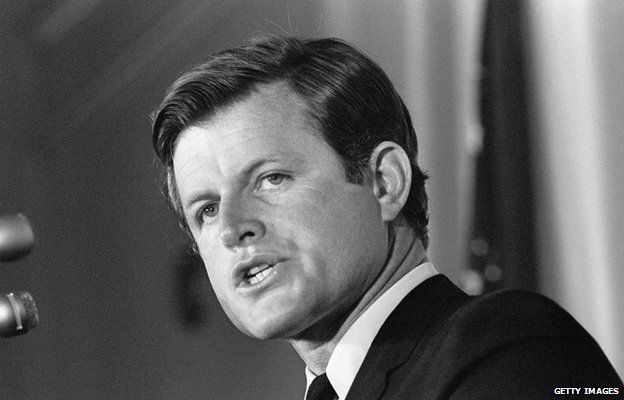 Almost forgotten in the other storylines of the 1968 Democratic Convention was the two-hour boomlet (or so it seemed) to run Ted Kennedy in place of his assassinated brother, Robert. Theodore White recounts the moment (p. 351-354), noting that it was briefer, more fleeting, and far less likely than the press coverage that Tuesday evening made it seem. Kennedy would never allow himself to be seen actively courting such a movement, and the forces needed to make it happen were too unlikely as allies.
Almost forgotten in the other storylines of the 1968 Democratic Convention was the two-hour boomlet (or so it seemed) to run Ted Kennedy in place of his assassinated brother, Robert. Theodore White recounts the moment (p. 351-354), noting that it was briefer, more fleeting, and far less likely than the press coverage that Tuesday evening made it seem. Kennedy would never allow himself to be seen actively courting such a movement, and the forces needed to make it happen were too unlikely as allies.
He then delivers, in a footnote, his damning indictment of the press and its coverage of that non-development:
It has always seemed to me unfair to criticize the floor reporters of television for behavior forced on them by the commercial competition of their networks. To report a convention from the floor, the networks choose their best political correspondents…Turned loose in the compact space of the convention floor, with dozens of Governors and Senators, scores of Congressmen, political bosses, old contacts and political freshmen, they are as happy as dogs in a meat market. No one can escape their cameras and microphones; nor do many delegates want to escape a televised interview…
Delegates thus lived in an echo chamber; and so, as a matter of fact, did the reporters themselves. Floor reporters are turned loose on a chase, and the director in the control room calls the course, the story-line they must chase. On the convention floor, someone can always be found to say anything, and it remains only for good direction to put the fragments together in dramatic form. Neither the delegates nor reporters can be blamed; only the mechanism and its programming, which calls for competitive and rival drama to hold audience.
If the script that night had called for the discovery and dissemination of a Southern revolt, or the candidacy of Lester Maddox, the reporters could have delivered that to the nation, too – all carved out of truth, from the lips of authentic and honest men on the floor.
This is something to bear in mind as we head towards Cleveland, with Trump’s poll numbers beginning to tank and his fundraising outlook getting bleaker. There will be reports of incipient revolt, of blocs of delegates withholding their support, of Rubio and Kasich (who retain control over their delegates) trying to organize Cruz delegates to deny Trump the nomination on the first ballot.
With the increasing likelihood of violent events taking place outside the hall, and the necessity of word-of-mouth organization of the delegate inside the hall, things have changed less than people think, even with the advent of social media. We’ve seen how those media are highly susceptible to the manipulation of a very few influential practitioners with many followers.
Add to that the fact that, unlike in Chicago in 1968, the press will be actively looking for stories designed to make the Republicans look bad. Certainly, the press’s favorite story-line already is the failure of the party to unite. They will find ample fodder for that claim, and any other they decide they need on Monday, Tuesday, or Wednesday evening.
Caveat emptor.



